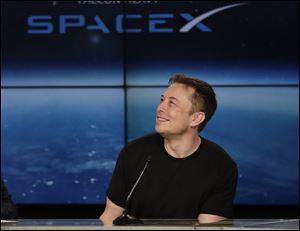
Elon Musk's meltdown
6/1/2018
Elon Musk, founder, CEO, and lead designer of SpaceX.
Elon Musk made many journalists livid last week. As part of a series of barbs at mainstream media, he suggested creating a website where readers can “rate the core truth of any article.” Over time, journalists and publications would receive a “credibility score.” He already has a name for the site: Pravda.
Touché, Mr. Musk. Summoning the Soviet Union’s official newspaper always gets a rise.
Click here to view more Blade editorials
Adding injury to his insult, Mr. Musk made his pronouncements on Twitter, a digital platform that has helped turn journalism upside down.
Though it’s hard to tell journalists what to do (ask any editor), offended scribes would have been better off counting to 10 and taking Mr. Musk’s mischief in stride. He’s not a government official planning to clamp down on press freedoms. He’s an inventive billionaire entrepreneur spouting off after bad media coverage about his business, Tesla.
The dust-up, of course, has led to more press coverage of production delays in Tesla’s Model 3 line, the electric car company’s struggle to pay off debt as losses mount, and dangerous working conditions at its California plant.
That’s what’s great about freedom of speech. Mr. Musk proposes the crowdsourced vetting of media. He polls his 21 million Twitter followers — and 88 percent who responded say they like the idea. Some journalists freak out. But everyone gets the message that credibility matters. Members of the media need to be able to take heat as well as give it.
An equally pertinent example of the value of press freedom came from Washington recently. On May 22, reporters were banned from an Environmental Protection Agency meeting on toxic chemical contamination of drinking water. An Associated Press reporter got into a scuffle with a security guard over it. The silly ban was soon lifted after a proper amount of outrage.
Sen. Chuck Grassley, the Iowa Republican who has served in the Senate since 1981, had the best response. “You’re the policemen of our system,” Mr. Grassley said the following day in a conference call with reporters. “So if you want bureaucrats to be responsible, they’ve got to be responsible for what they do, and that meeting should have been open to the press.”
That’s the voice of a confident public figure. So what if he has only 212,000 Twitter followers?